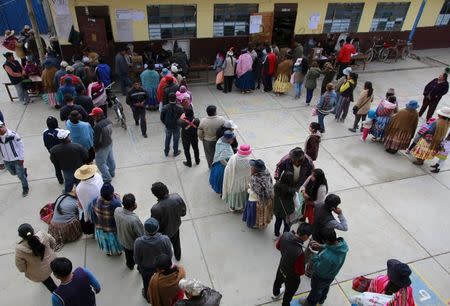Bolivia referendum for fourth presidential term may be close call
By Daniel Ramos and Monica Machicao LA PAZ (Reuters) - Bolivians voted on Sunday in a referendum that will decide if President Evo Morales can stay in power for a fourth term, with the result looking uncertain as support for the once popular leader has ebbed. Morales, currently on his third term, is seeking to change the constitution so he can run for re-election in 2019, potentially allowing the onetime coca grower to remain president until 2025. While voters across Latin America have largely turned against the populist leftists that once dominated the region, Morales, Bolivia's first indigenous president, has remained standing. But that may be about to change. Polls in recent weeks have shown Morales with a slight but weakening lead, and a survey by Equipos Mori last week put the 'yes' and 'no' votes in a dead tie, with some 11 percent undecided. [nL2N15R0PX] Morales has been credited with slashing poverty in one of South America's poorest countries by spending a natural gas windfall on welfare programs and new infrastructure. In 2014 he won re-election with 61 percent of the vote. If he wins the referendum, he says he will continue his '2025 Agenda' that includes eradicating extreme poverty. His core supporters are voters like widowed mother-of-ten Lourdes Alarcon, who says in recent years she has seen new schools, improved sanitation and paved roads in Achocalla, a rural area on the outskirts of the capital La Paz. "There are good to reasons to support (the 'yes') because I think instability is damaging for a country. We want more good years and good projects," she said. But a growing body of critics charge Morales' administration with corruption, waste and authoritarianism. Recent allegations about an ex-girlfriend whose company has won lucrative government contracts have weighed heavily on his popularity. In a middle-class neighborhood in a southern district of La Paz, 37-year-old Susana Macias said she was voting 'no' as a form of "rebellion". "We feel we have been tricked. The people who are leading us are not who we thought they were," she said. With feelings running high, six people were killed in protests this week, apparently after Morales supporters set fire to an opposition local government office. But observers said people were voting peacefully on Sunday with no sign of trouble. [nL8N15W5FK] "It looks like being a much closer-run contest than anything Evo Morales has had to fight since he became president in 2006," said John Crabtree, a Latin American political analyst based at Oxford University. Provisional results are expected soon after polls close at around 2000 local time (0000 GMT). (Additional reporting and writing by Rosalba O'Brien; Editing by W Simon and Mary Milliken)







